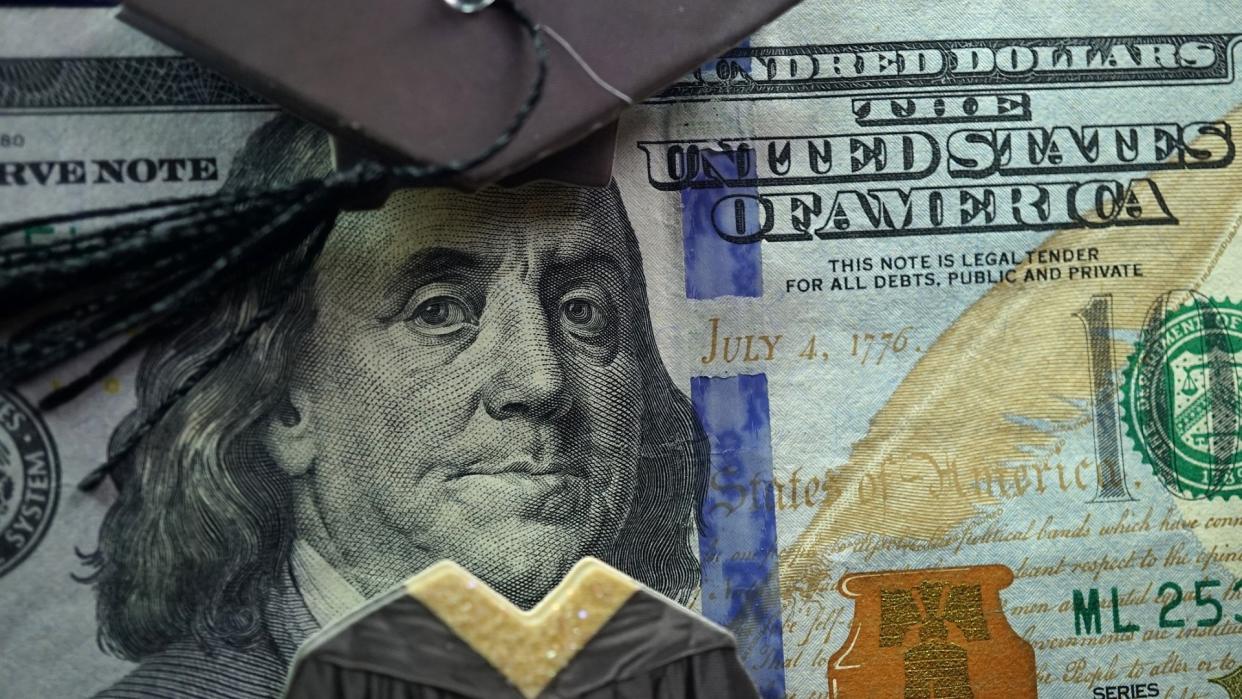Here’s How Often You Can Refinance Your Student Loans — and What To Consider Before Doing It Multiple Times

With the cost of college increasing significantly over the past few decades, more Americans have had to rely on student loans and financial aid. According to the Federal Reserve, the total student loan debt in the U.S. sits at over $1.73 trillion in federal and private loans, as of the third quarter of 2023.
See: You Can Get These 3 Debts Canceled Forever
Find: Pocket an Extra $400 a Month With This Simple Hack
More than 50% of students leaving school have debt, with the average student owing $28,950, per Forbes. Although federal student loan borrowers had their loan payments paused during the COVID-19 pandemic, nearly 37 million of them were forced to restart repayment plans in Oct. 2023.
A way forward for any sort of widespread federal loan forgiveness seems unlikely to say the least. For borrowers struggling to make ends meet and who can’t turn to options like income-driven repayment programs and Public Service Loan Forgiveness (PSLF) plans, refinancing their student loan might be the most viable way to pay off debt quicker and save money.
Also: 6 Ways To Build Wealth in Less Than Five Years
How Often Can you Refinance Your Student Loan?
Refinancing student loans allow borrowers to trade in their existing loan for a new one with a private lender. By renegotiating your loan for one with lower rates, you could potentially save hundreds or thousands of dollars and strengthen your overall future financial strategy.
If you qualify for better loan rates, you can refinance your student loan an infinite number of times throughout your life — though a lender might enforce a waiting period between when you close on a loan and refinance to a new one.
Reasons To Refinance Your Student Loan
If you have a good credit score and a steady income, refinancing a student loan multiple times can be beneficial for several reasons. If you took out a loan when interest rates were high, want to remove a co-signer from your student loan or want to extend your repayment term, refinancing should be an easy decision.
Obtaining a lower interest rate
You may want to refinance your student loan to take advantage of a lower interest rate. You can almost always save money if you’re able to lower your interest rate without changing the term of your loan — and some lenders even offer special promotions or discounts for refinancing with them.
Removing a co-signer from your student loan
Having a co-signer can make it easier to qualify for private student loans when you lack an adequate credit history to get approval on your own. However, entering a loan agreement with a co-signer can have financial implications for all parties involved, since everyone is equally responsible for the debt. Although some private lenders’ loan terms provide for a co-signer release after making a set number of consecutive payments, you can easily remove a co-signer when you refinance.
Changing your loan term
For better or worse, you never know when a change of income can happen. Coming into more money, whether through a pay bump, inheritance or secondary income stream, might make you want to pay off your loan earlier. Conversely, you might need to drag your loan to a longer term that suits your current financial situation. This won’t save you money and will increase the amount you pay in interest over time, but it might be a necessary decision at some point.
What To Consider Before Refinancing Your Student Loan
If you’re going to refinance an existing student loan, you should make sure it’s actually worth it. While there are several benefits to reworking your loan, there are also things you should consider before doing so.
Are you getting a lower rate?
The primary purpose of refinancing any loan or mortgage is to pay less money to your lender. But once you’ve refinanced to an ideal rate, there’s little reason to ever do it again, unless you’ve managed to negotiate terms that suit your unique financial repayment plan.
Impact on your credit
As Forbes noted, there’s a chance your credit score could take a hit every time you refinance since you’re taking out a new loan. With every loan application comes with a hard credit check by the lender, which will be reflected as an entry on your record. Like a resume with too many job starts and ends, too many loan openings and closing can be detrimental to your credit. However, most borrowers find that their score recovers or even improves after a few months of on-time payments.
Losing out on federal student loan terms
If you are already locked into a federal loan program like PSLFs and income-driven repayment programs, there might not be a good reason to refinance your loan and take on a new one under a private company. While recent efforts by President Biden to enact an extensive federal student loan forgiveness program have been stymied by Republican opposition, switching to a private creditor could prevent you missing out on any future relief should a federal student loan forgiveness program miraculously pass through Congress.
More From GOBankingRates
I'm a Bank Teller: Here Are 10 Mistakes You Are Making With Your Banking
Use This Checklist To See Whether Your Bank is Costing You a Lot of Money
This article originally appeared on GOBankingRates.com: Here’s How Often You Can Refinance Your Student Loans — and What To Consider Before Doing It Multiple Times
